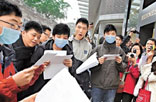Facing up to the past
Updated: 2012-02-29 08:02
(China Daily)
|
|||||||||||
Japanese politicians, including in the latest instance, Takashi Kawamura, mayor of Nagoya, should stop denying the atrocities that Japanese soldiers perpetrated in Nanjing during their occupation of the city. Such disregard for the suffering of the Chinese people during Japan's invasion of China distorts the historical facts, damages Sino-Japanese ties, and hinders a shared regional historic outlook among the related countries in East Asia, says an article in Beijing News. Excerpts:
The recent repeated denials of the 1937 Nanjing Massacre by Takashi Kawamura, mayor of the Japanese city of Nagoya, is very provocative for Chinese people especially as this year marks the 40th anniversary of the normalization of Sino-Japanese diplomatic relations.
China's Ministry of Foreign Affairs countered Kawamura's claim immediately, saying the Nanjing Massacre is a proven atrocity that is undeniable and recognized by the international community. The Nanjing government has announced that it will suspend inter-government contacts with Nagoya.
Although Kawamura's speech aroused public anger in China, and some Japanese media outlets said it was inappropriate, the Japanese government and the public seem willing to tolerate Kawamura's propagation of lies. Such sayings are accepted as "reasonable", or at least "not unreasonable" views in Japan, partly because it enables the Japanese people to avoid looking at their own family histories.
Although Japan has reflected on the war, what it chooses to emphasize is war hurts everyone, rather than the war hurt the people of the countries that Japan invaded. Japan portrays itself a victim of the war, but doesn't truly reflect on why the atomic bombs were dropped on Hiroshima and Nagasaki.
Japan should face up to its past.
From time to time, Japanese politicians or scholars seek to challenge the credibility of the Nanjing Massacre. Some have queried the death toll, some have claimed it was just a normal consequence of the war; Takashi Kawamura denied the facts because of the experiences of his father, who told him he was welcomed in Nanjing in 1937 when the Japanese military occupied the city.
However, the truth can't be challenged. At least 300,000 Chinese people were killed in the six-week orgy of violence. The mass tombs, news reports and photographs, and the harrowing testimony of survivors all confirm the massacre took place.
Japan is striving to become a permanent member of the United Nations Security Council. But the remarks of some of its politicians are deeply disturbing, especially to countries such as China and South Korea which suffered under the Japanese invasion, and only serve to show their lack of political wisdom.
Political wisdom is needed to solve the disputes that are an unsettled legacy of the war, and a common acceptance of historical truths is required if Asia is to become a united regional community.
But overcoming the historical differences requires sincerity and the strength of character to face squarely up to the past.
(China Daily 02/29/2012 page9)




